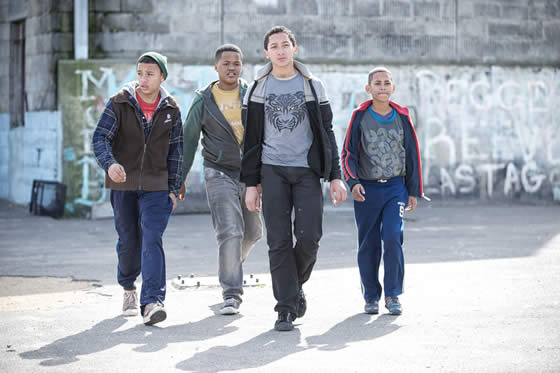 Ever since the success of “City Of God”, filmmakers in developing countries have been recycling its tropes in less effective imitations. Ian Gabriel’s “Four Corners”, South Africa’s foreign Oscar submission has something new to say and show us. Gabriel (“Forgiveness”) and co-writers Terence Hammond and Hofmeyr Scholtz have produced a taut script filled with surprises. The only scene approaching cliché, a last act shoot-out, packs its own surprise.
Ever since the success of “City Of God”, filmmakers in developing countries have been recycling its tropes in less effective imitations. Ian Gabriel’s “Four Corners”, South Africa’s foreign Oscar submission has something new to say and show us. Gabriel (“Forgiveness”) and co-writers Terence Hammond and Hofmeyr Scholtz have produced a taut script filled with surprises. The only scene approaching cliché, a last act shoot-out, packs its own surprise.
“Four Corners’ is slang for prison cell. A battle in the prison lunchroom swirls around “28” leader Farakhan (Brendon Daniels) who calmly eats as murder and reprisal play out in an acute choreography of violence. A pull back to wide shot has something of Scorcese to it.
Farakhan’s about to be released from Pollsmoor, South Africa’s toughest maximum Security prison, and, as part of the ritual, blood of the rival gang must be spilt. (“Blood in, Blood Out!”)
Renamed Farakhan) in prison, where he’s serving out a 13-year sentence, he’s the leader of the 28’s, warring the rival “number” gang (the 26’s) sworn to a hundred year-old blood turf war.
All he wants is to settle his debt with the 6’s, who killed his father, then find his son and live a quiet life in his old house. But the age-old feud, and the younger gangs that have taken charge while he was in stir, won’t let that happen. “Nice Time”, “Americans”, “Mongrels” and “Dixie Boy”, these new gangs don’t follow the old Blood rules. Guns and crack are sold openly on the street. Stakes are up. What’s more a serial killer is sought for a body count of missing youth from Cape Flats.
Farakhan faces up to his past, reuniting with old flame Leila and son Ricardo.
Like Matteo Garrone’s 2008 “Gomorrah”, which filmed in harrowing districts controlled by the Camorra syndicate Casalesi clan in Naples and Caserta (Garrone’s crew was under protection of the gang), Gabriel shot in areas frightening to both media and the police. This the first film shot in Tsotsi taal, Cape Afrikaans and the Cape English dialect and Sabela (the secret language of the Number Gangs)
The wide impassive face of Ricardo (Jezriel Skei), a teen chess wizard who declines to wear a flag gang tattoo while all his mates choose sides, draws us to him. He’s canny, a watcher, always judging the next move. In fact the film’s TAGLINE is “Life. Or death. It’s your move.” Ricardo, who’s never known his father is drawn into “Americans” gang leader Gasant (Irshaad Ally) Ricardo’s orbit, who pressures him to choose side and sport his flag.
Ricardo offers to win the pot in local chess games, wagering Gasant’s money. He fails and falls into Gasant’s debt.
But local police detective Captain Tito Hanekom (Abdurahman Adams) a career cop tracking down the serial killer, also has his avuncular eyes on the young chess champ.
Ricardo’s arrested as an accessory for murder for being in the right place at the wrong time. Tito takes an interest. When another young boy goes missing. Tito’s focus shifts away from Ricardo. Ricardo has to make some tough decisions about where his life is headed.
Expat Dr. Leila Domingo (Lindiwe Matshikiza-Zindzi Mandela in “Mandela: Long Walk to Freedom”) returns to the Cape Flats for her father’s funeral. Caught up doing emergency medicine after the prison slaying, Leila missed the funeral but stays to sell her family home. But what’s to be done with her surprising boarder Manzi, promised a home for life after saving her father’s life.
Leila resented her father’s meddling. Before she left the country to study, he forbade her to hang with her dubious friends (including boyfriend Lee -now known as Farakhan). She studied medicine in London and never looked back.
South African vet actor Jerry Mofokeng (last seen here in “Fanie Fourie’s Lobelia”) plays neighborhood elder Manzi, backed by Israel Makoe (“The First Grader”) as Farakhan’s best friend Joberg, surrounded by a strong cast of film novices.
With the exception of the lead supporting actors playing Farakhan (Brendon Daniels) and Ricardo (Jezriel Skei) the prisoners (youths and adults) were cast from Victory Outreach, a rehabilitative program for ex -gang and drug users, and the Ottery Reformatory, where actual juvenile offenders played the juvenile quad scene.
The pre-teen and teen chess contestants chosen from thousands seen at school and chess club casting sessions, which is where Gabriel found his lead, 13 year old Jezriel Skei from Johannesburg.
DP Vicci Turpin’s wide screen compositions and a rich soundtrack by Cape Town’s Markus Wormstrom mixes hip-hop and classical compositions, wrap the story. A MUST SEE

